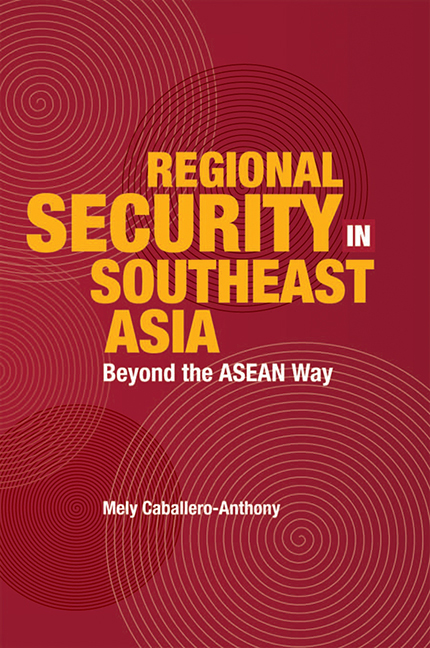Book contents
- Frontmatter
- Contents
- Acknowledgements
- INTRODUCTION: Regional Security in Southeast Asia: Beyond the ASEAN Way
- 1 Regionalism and Regional Security: Locating ASEAN
- 2 ASEAN's Mechanisms of Conflict Management: Revisiting the ASEAN Way
- 3 ASEAN and the Cambodian Conflict: Testing the Limits of the ASEAN Way
- 4 ASEAN Regional Forum: Extending the ASEAN Way in Managing Regional Order
- 5 ASEAN's Track Two Diplomacy: Reconstructing Regional Mechanisms of Conflict Management
- 6 The Asian Economic Crisis and Other Challenges: Turning Points Beyond the Comfort Zone?
- 7 ASEAN and Civil Society: Enhancing Regional Mechanisms for Managing Security
- 8 Conclusion: Beyond the ASEAN Way
- APPENDIX I Declaration of ASEAN Concord II (Bali Concord II)
- APPENDIX II Recommendations of the High-Level Task Force on ASEAN Economic Integration
- APPENDIX III ASEAN Vision 2020
- APPENDIX IV Declaration of ASEAN Concord
- Selected References and Further Readings
- Index
- About the Author
7 - ASEAN and Civil Society: Enhancing Regional Mechanisms for Managing Security
Published online by Cambridge University Press: 21 October 2015
- Frontmatter
- Contents
- Acknowledgements
- INTRODUCTION: Regional Security in Southeast Asia: Beyond the ASEAN Way
- 1 Regionalism and Regional Security: Locating ASEAN
- 2 ASEAN's Mechanisms of Conflict Management: Revisiting the ASEAN Way
- 3 ASEAN and the Cambodian Conflict: Testing the Limits of the ASEAN Way
- 4 ASEAN Regional Forum: Extending the ASEAN Way in Managing Regional Order
- 5 ASEAN's Track Two Diplomacy: Reconstructing Regional Mechanisms of Conflict Management
- 6 The Asian Economic Crisis and Other Challenges: Turning Points Beyond the Comfort Zone?
- 7 ASEAN and Civil Society: Enhancing Regional Mechanisms for Managing Security
- 8 Conclusion: Beyond the ASEAN Way
- APPENDIX I Declaration of ASEAN Concord II (Bali Concord II)
- APPENDIX II Recommendations of the High-Level Task Force on ASEAN Economic Integration
- APPENDIX III ASEAN Vision 2020
- APPENDIX IV Declaration of ASEAN Concord
- Selected References and Further Readings
- Index
- About the Author
Summary
The shaping of a future of peace, friendship and co-operation is far too important to be left to governments and government officials. The need is for ever-expanding involvement and participation of the people…. As someone who has shared in the privilege of giving life to ASEAN, I may be permitted to observe that while ASEAN has indeed made impressive progress in many fields of co-operative endeavour, much more needs to be done, especially in the non-governmental sphere.
— Adam Malik, circa 1980 (Former Foreign Minister of Indonesia)INTRODUCTION
As noted in the previous chapter, the economic crisis of 1997 became a watershed for ASEAN, particularly in the way it had to respond to regional problems brought on by the crisis. There is however a paradox to the crisis. While the attendant challenges stemming from the crisis should have resulted in a less cohesive association, as members were expected to turn inward to attend to domestic problems, the crisis however became a rallying point for ASEAN to become more responsive and bolder in instituting mechanisms to handle regional problems. We noted that it was in December 1997, just a few months after the onset of the financial crisis, when ASEAN leaders unveiled the ASEAN Vision 2020 at the ASEAN Second Informal Summit in Kuala Lumpur. The ASEAN Vision 2020 articulated the leaders' vision of an “ASEAN as a concert of Southeast Asian nations, outward looking, living in peace, stability and prosperity, bonded together in partnership in dynamic development and in a community of caring societies”.
A closer look at the preamble of the ASEAN Vision 2020 would reveal that the Vision had essentially set out the three-part agenda of ASEAN in the new millennium. These were: political and security cooperation, economic co-operation, and building a community of caring society. This agenda was reaffirmed and rearticulated at the Ninth ASEAN Summit in October 2003 when the ASEAN leaders adopted the ASEAN Concord II (also referred to as Bali Concord II) that declared the establishment of an ASEAN Community comprising three pillars, which are essentially the same as three areas of co-operation identified in the Vision 2020.
- Type
- Chapter
- Information
- Regional Security in Southeast AsiaBeyond the ASEAN Way, pp. 232 - 254Publisher: ISEAS–Yusof Ishak InstitutePrint publication year: 2005

